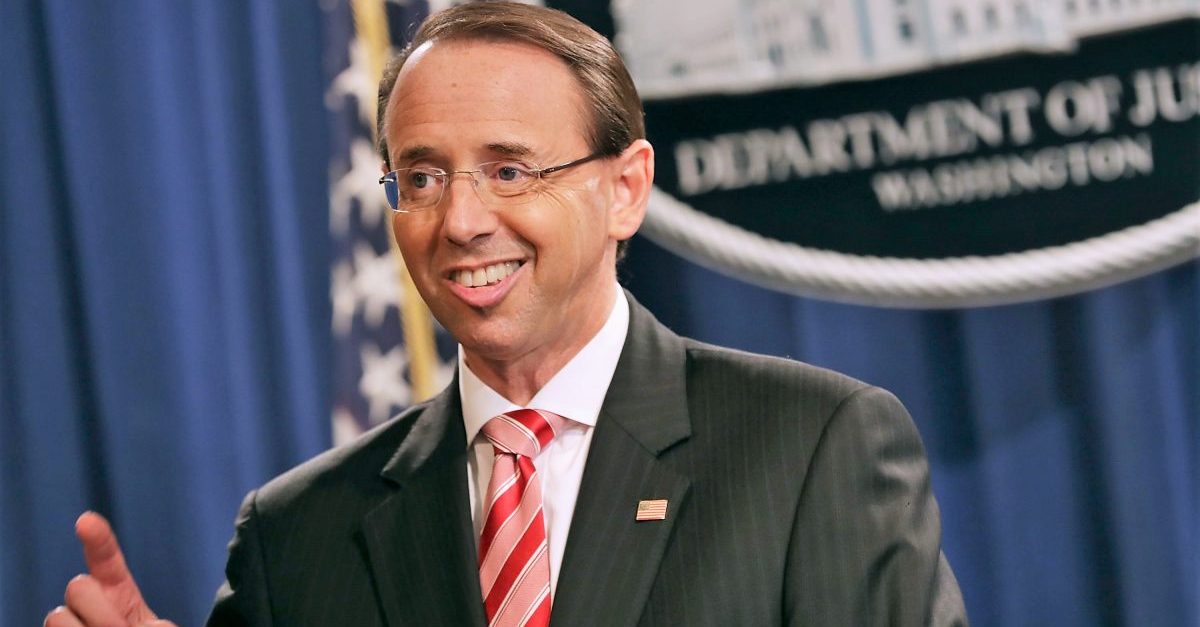
After a two-year criminal investigation into Walmart allegedly revealed a widespread practice of dispensing opioids without a legitimate medical purpose, federal prosecutors in Texas were preparing to take the unprecedented step of leveling criminal charges against the world’s largest company. But after a 2018 meeting with top Trump appointees at the Department of Justice, led by then-Deputy Attorney General Rod Rosenstein, the prosecutors were first prevented from filing criminal charges, then prevented from pursuing a civil case against company, ProPublica reported Wednesday.
According to the massive report, the prosecutors presented clear evidence showing that Walmart provided opioids that resulted in overdoses throughout the country, even after the company’s pharmacists told Walmart they shouldn’t be filling the scripts because they were being written by doctors who were clearly running “pill mills.” One employee even provided records showing that a doctor in Florida maintained “a list of patients from Kentucky that have been visiting pharmacies in all of central Wisconsin,” sending patients to different Walmart’s across 30 states.
Walmart’s reported response:
In response to these alarms, Walmart compliance officials did not take corporate-wide action to halt the flow of opioids. Instead, they repeatedly admonished pharmacists that they could not cut off any doctor entirely. They could only evaluate each prescription on an individual basis. And they went further. An opioid compliance manager told an executive in an email, gathered during the inquiry and viewed by ProPublica, that Walmart’s focus should be on “driving sales.”
After getting the DEA’s acting administrator Uttam Dhillon on board, the prosecutors met with Rosenstein and several other top-level Trump administration appointees at the Department of Justice in Washington.
Joe Brown, then the U.S. Attorney for the Eastern District of Texas, and his team again presented the evidence, explaining that Walmart’s business practice was “akin to dealing heroin”; they implored Rosenstein not to allow it to go on.
“We have to act,” Brown reportedly said.
Siding with the prosecutors, Dhillon said fining Walmart was pointless because the company “has more money than it knows what to do with.”
“Not that there’s anything wrong with that,” Rosenstein responded, five people familiar with the investigation told ProPublica. “We are all capitalists here.”
“Rosenstein’s quip brought the prosecutorial team up short,” the report said. “Not long after, Rosenstein’s assistant entered the room to say he had a call. He left. The prosecutors’ push to persuade Rosenstein to revive the criminal case had failed.”
That same month, President Donald Trump signed legislation specifically aimed at combatting America’s opioid epidemic. A civil case against Walmart was also halted by Trump appointees in the DOJ leading Brown to resign in protest.
Asked about his comments, Rosenstein told the outlet that he did not specifically remember the “capitalist” remark but said the DOJ “reached every decision after considering the non-partisan factors set forth in the Justice Department’s principles of federal prosecution.” Law&Crime also reached out to Rosenstein for comment. He declined to comment.
Rosenstein is now working in private practice.
Walmart, for its part, commented on the investigative report through spokesman Randy Hargrove. Hargrove said that prosecutors “engaged in misconduct multiple times as it investigated Walmart, including threatening to bring meritless criminal charges against Walmart in order to extort an unjustified civil settlement from the company.”
Hargrove said that behavior violated DOJ policies and legal ethics.
[Image via Chip Somodevilla/Getty Images]